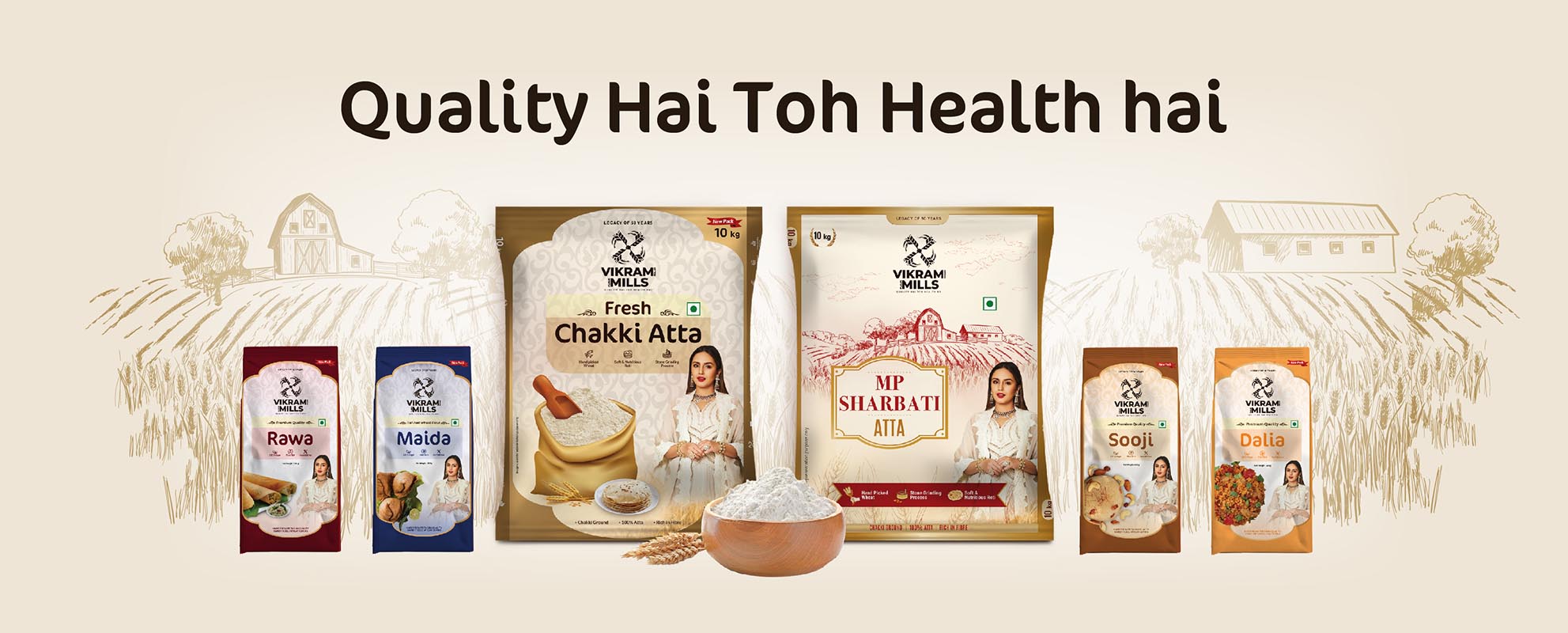Fresh Chakki Atta Quality Parameters

Whole wheat flour or Atta is a staple in most Indian households. This is because the Indian diet is almost incomplete without chapatis included in the meal. These amazing hot Phulkas that are made of whole wheat flour go well with any Dal or Sabzi. Coming directly from local Chakki mills to the table, most of the Indian market is dominated by Chakki Atta. But now, slowly and steadily packaged whole wheat flour is gaining popularity.
With the introduction of new whole wheat flour variants in the market, it's essential for consumers to be able to identify which whole wheat flour variant is their go-getter. To figure out what differentiates one whole wheat flour variant from another, there are numerous fresh chakki atta quality parameters. These quality parameters grade the various whole wheat flour variants. Let's find out various fresh chakki atta quality parameters.
Table of Content:
- Moisture
- Gluten
- Total Ash
- Crude Fiber
- Alcoholic Acidity
- Carbohydrates
- Water Absorption Percentage
- Pesticides Residue
- Heavy Metal (Lead)
- Aflatoxins
- Uric Acid
- Calorific Value
- Protein
An interesting read for you: How to make fulka
-
Moisture
Moisture is the amount of water present in the wheat flour. Neither very high nor very low moisture content present in the wheat flour works well. It simply deteriorates the quality of the flour. Only 13-14% moisture content in the whole wheat flour is suitable for a reliable cooking experience.
-
Gluten
Gluten is the wheat flour's natural protein content that provides the dough with elasticity, strength, and gas retaining properties. It can also be defined as the elastic mass that is left behind after washing the wheat dough to remove water-soluble constituents and starch granules. As per Food Safety and Standards Regulations, gluten in wheat flour should be between 6%-10%.
-
Total Ash
Ash is the mineral material of whole wheat flour. The total Ash content in wheat flour is primarily affected by the ash content of the wheat from which it was milled and extracted. The total Ash content in whole wheat flour should be less than 2%.
-
Crude Fiber
Crude fiber is basically the measure of the quantity of indigestible lignin, cellulose, pentosans, and other types of components present in the food. As per the FSS, the crude fiber content of whole wheat flour should not exceed 2.5%.
-
Alcoholic Acidity
When wheat flour is stored for long, it undergoes various types of deterioration. This in turn increases the alcoholic acidity which is not good for the quality of the wheat flour. Therefore, alcoholic acidity should always be less than 0.18%. It is because the higher the alcoholic acidity, the poorer the quality of the wheat flour.
-
Carbohydrates
Carbohydrates are one of the major components of wheat flour. They are the source of energy. Therefore, carbohydrates are expected to be high in wheat flour.
-
Water Absorption Percentage
Measurement of the water absorption in the wheat flour is necessary to access the nature of the flour. It directly relates to the quality and the protein content of wheat flour. Water Absorption is necessary for the process of precise dough making. Therefore, the water absorption percentage should always lie between 60-65%.
-
Pesticides Residue
Pesticide is a chemical or biological agent that is used to kill any pests. They can cause acute damage to the human body. As per FSS Regulations, the maximum permissible limit for any pesticide is not more than 20mg/kg.
-
Heavy Metal (Lead)
Lead is a heavy metal that is highly poisonous and can cause severe damage to the brain and other organs of the body. The permissible limit for lead in whole wheat flour is 2.5mg/kg. Anything more than this limit could lead to a decrease in neuronal growth, brain disorders, etc.
-
Aflatoxins
Aflatoxins are kinds of toxins or chemicals that are produced by the mould Aspergillus flavus. When humans consume it, it may cause several undesirable health effects. Therefore, as per FSS Regulations, Aflatoxins should not exceed 15 µg/kg.
-
Uric Acid
Maintaining a low uric acid level in the human body helps guard against kidney stones. Therefore, it is suitable if the whole wheat flour contains not more than 100mg/kg uric acid in the whole wheat flour.
-
Calorific Value
Calorific value is the amount of energy in the form of calories our body obtains from food. There is no particular requirement prescribed in the national standards but it is considered to be better if it's high. The more, the better.
-
Protein
Protein is an essential nutrient that plays a vital role in the growth and functioning of the human body. It is inherently found in whole wheat flour. The national standards don't specifically prescribe a particular limit for the protein content in whole wheat flour. But higher the protein content in wheat, the higher the quality.
Conclusion
These were the Fresh Chakki Atta Quality Parameters that the safety standards swear to abide by. Next time, while buying whole wheat flour for yourself, ensure to only buy flour that abides by all the set quality parameters. These quality standards ensure the whole wheat flour is safe and healthy for human consumption.
If you wish to buy whole wheat flour that abides by all quality parameters, make the right choice of choosing Vikram Flour Mills' Fresh Chakki Atta for your family. Visit us at https://vikrammills.com/ and order the best wheat flour for your family.

Vikram Roller Flour Mills Limited is a pioneer name in the Agro-products manufacturing, packaging, and delivery in India. The company specializes in manufacturing supreme quality wheat products that are consumed by top-level bakers, caterers and FMCG suppliers in the country.
Know More About Us





